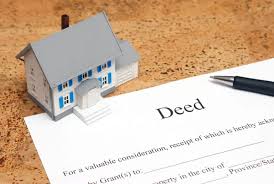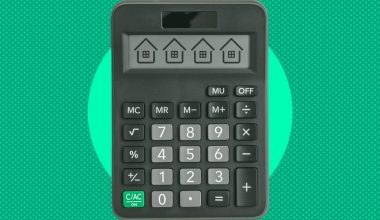A “contract for deed” is a legal phrase used to refer to a property purchase that occurs directly between both the buyer and seller, without the involvement of a lender. Additionally, it is referred to as an installment purchase contract, installment land contract, or deed bond. This article will expose you to the full understanding of what a contract for deed is all about, its disadvantages, and how it works?
What Is A Contract For Deed & How Does It Work?
A contract for deed is an arrangement for the purchase of real estate without the assistance of a mortgage lender. The buyer offers to pay the seller monthly bills, and the buyer receives the deed upon completion of all payments. In other words, a Contract for Deed is a sort of sales contract used in the acquisition of real property. What distinguishes it from other asset class purchase agreements is that the seller is the one funding the process.
With a contract for deed, the seller of the property gives a loan to the buyer; in exchange for the buyer purchasing the property on the conditions specified in the contract. This is why seller funding is also thought of as a contract for deed. Generally, the buyer is not obliged to submit a down payment. When the buying deal closes, the buyer has possession and responsibility for the property but does not legally own it; until the contract’s provisions are met, which often occurs when the seller’s mortgage is paid back.
Advantages For Buyers In A Contract Deed
All you truly need is the seller’s willingness to conduct business with you. You may have greater negotiating power when it comes to the down payment; and you will avoid paying closing costs, origination fees, and other fees associated with obtaining a mortgage. If you default on a traditional mortgage, the lender may require you to repay the full debt; even if you make up all missed payments. Unless you agree to include that language in your contract; a seller utilizing a contract for deed does not have that option. Additionally, there are several advantages: no loan qualification, a low or flexible down payment, competitive interest rates, and terms, and a quicker settlement.
Disadvantages For Buyers In A Contract Deed
The primary danger associated with purchasing a home contract for deed is that you will not have a legal claim to the property; until the complete purchase amount has been paid. This implies that if you default on your payments and are unable to make them; you forfeit the property and all of the money you have already invested. In contrast to a conventional mortgage, a defaulting buyer in a contract for deed may have only 30-60 days; to remedy the default or vacate the property.
Another significant danger is that the seller may continue to encumber the property with liens and mortgages; because they are not compelled to transfer clear title until all contract payments are made. Additionally, there are relatively minimal disclosure/inspection requirements. This means that a buyer who does not conduct a comprehensive assessment of the home; may find a home with serious flaws that require costly repair.
Advantages For Sellers In A Contract Deed
A contract for deed enables you to conduct business with a buyer who is unable to obtain a conventional mortgage. Typically, the procedure is faster than a traditional mortgage sale. If the buyer defaults, you can immediately terminate the contract without going through the lengthy legal process required; for a mortgage holder to foreclose on a home. Additionally, there is no assessment necessary, a broader choice of purchasers, the possibility of profit on financing; and a faster settlement.
Disadvantages Of Sellers In A Contract Deed
For a seller, the primary disadvantage of a contract for deed is that; the property will remain in your name for many years. This most likely will not fit your investment approach. Additionally, you will have to wait until the contract is completed before receiving the entirety of your money; as opposed to receiving an immediate payment of the total purchase price from a traditional mortgage company. Additional hazards include the loan remaining on your credit report, the seller remaining accountable for the loan, the risk of the buyer defaulting on the loan; and the buyer never going through the formal application procedure associated with a conventional mortgage. Besides, the seller retains legal title to the property, and if the buyer fails to maintain the property in accordance with applicable code; and ordinance standards, the seller may be susceptible to fines, litigation, and other legal complications as a result.
What You Should Know About Purchasing A Home Through A Contract For Deed
Buyers must comprehend the contract’s conditions, which include the buying value of the home; the rate of return on the seller’s mortgage, the period of the loan, and whether the mortgage requires a downpayment. Buyers should be aware of the specific items for which they are accountable under the contract for deed. Along with monthly installments to the seller, buyers are often responsible for property taxes, homeowners insurance, and any property upkeep. Additionally, buyers may be responsible for costly modifications to keep the property up to standard; within a specified time period following the contract’s completion. Ascertain that you understand the expenditures for which you are liable and that you can afford them.
Ascertain that the seller genuinely owns the property and that no existing liens exist against it. Contact your county recorder’s office or a title company to obtain this information. You want to ensure that the person selling you the property genuinely owns it and is not attempting to defraud you. Also, you want to ensure that there are no pending liens against the property; that could stop you from relocating or acquiring legal title in the future.
The Differences Between A Deed Of Trust And A Mortgage
Purchasing a home through a contract for deed provides less constitutional protection than purchasing a home through a mortgage does. If you fall behind on your loan repayments or enter default for any reason, you normally have six to twelve months to rectify the situation before losing the house. You may only have sixty days to rectify any faults with a contract before losing the property, depending on the contract’s provisions and state real estate rules.
The rate of return on a contract for a deed loan is normally 3% to 6% more than the interest rate on a conventional mortgage. A higher interest rate translates into higher repayments, plus you are liable for property taxes and insurance even if you do not own the home. Certain contracts require the buyer to make a sizable payment at the conclusion of the loan, referred to as a balloon payment.
Additionally, loan payments made pursuant to the contract are often not reflected on your credit report, which means that the buyer may not benefit from prompt payments. You can work with the seller and credit bureaus to have these payments included in your credit score, but unlike mortgage payments, this does not happen automatically.
Probably, you are wondering what the disadvantages of a contract deed look like, lets’s see them below.
Disadvantages Of A Contract For Deed
A contract for deed does not require a property assessment, title report, or home inspection when purchasing a home. This places the buyer at risk, as the property may have ongoing liens or major property destruction that the buyer is ignorant of. If you choose to utilize one, contact an impartial property inspector to document and determine the price of any property repairs, as you may be responsible for any modifications. There are a number of disadvantages for both buyer and seller in a contract of a deed.
#1. Risks Of Insolvency And Foreclosure
If a buyer falls behind on monthly payments, he or she risks losing the property and any money spent toward it because no equity in the property is realized until the loan is paid in full. According to Real Town, one of the disadvantages of a contract for deed to the seller is that if the buyer breaches the contract, clearing the title may take time and money. Additionally, if the buyer defaults, the seller has the right to promptly foreclose on the property, with no redress available to the buyer.
#2. Title Issues
Because a contract for deed is not subject to the same title requirements as a standard contract for sale, buyers run the disadvantages of purchasing a property with a poor title. Because sellers are not required to give a clean title until the final payment is made, buyers cannot be confident they will obtain a clean title to the property. According to the California Department of Real Estate, if the title conveyed is clouded, buyers frequently lack redress and are unable to cancel the contract due to the encumbered title. Additionally, liens against the seller may arise throughout the life of the contract, jeopardizing the seller’s title.
#3. Other Matters
Additionally, there is a risk of the seller going bankrupt, going missing, or dying, which would throw the property into probate and imperil the buyer’s contract. In that instance, the buyer’s sole option would be to engage in time-consuming and costly litigation to contest the seller’s claim to ownership of the property. Additionally, the seller may want to withhold deeding the property from the buyer following the final payment. Other possible circumstances, according to the California Department of Real Estate, include the seller failing to repay the lender with the buyer’s payments or the buyer being unable to assign her interests due to contract covenants prohibiting such assignment.
How Does A Contract For Deed Work
A contract for deed is a property sale agreement work in which the buyer has immediate possession of the land and pays the purchase price in installments over time, but the seller retains legal title until all payments are paid. Also known as a land contract, a land installment contract, or a land sales contract.
This sort of sale is adaptable, allowing both parties to customize the terms of the transaction to the circumstances. Consider the following scenarios in which a contract for deed sale would work out:
#1. To Circumvent Conventional Funding
The opportunity to avoid lenders makes a contract for deed an attractive option for buyers who are unable to acquire a conventional mortgage, whether owing to poor or insufficient credit, a lack of down payment, or other factors. In this instance, the seller may agree to a greater interest rate than the lender requires.
Additionally, during a period of unusually high-interest rates, a seller may wish to enter into contract work for a deed with the intention of attracting more possible buyers by offering a discount on regular rates.
#2. To Avoid Paying Costs
Contract work for deed sales can be less expensive than conventionally financed transactions, as they avoid many of the expenses connected with a regular loan. Closing costs may be lower as well, for the same reasons particularly if the transaction was negotiated without the involvement of a real estate agent.
#3. To Expedite The House Selling Procedure
Traditional real estate transactions might take an extended period of time. There are so many persons involved in the transaction, including the buyer, seller, and lender, whose schedules must be coordinated before everyone can sit down at the closing table together. Contracts for deed, on the other hand, can be swift. To file a legal contract work for a deed, all that is required is an agreement between the buyer and seller.
Naturally, registering the contract for deed with your county’s registrar of titles or registered office is crucial not only does this formalize the parties’ purpose, but you may risk a fine if you fail to do so.
#4. When The Vendor And Buyer Are Acquainted
A contract for deed is oftentimes useful to convey property ownership within a family, from one relative to another. Additionally, it can be desirable for a sale between close friends who trust one another sufficiently to avoid involving a bank or other financial institution.
Important Things You Should Know When Buying A House
Here are some critical points to consider when purchasing a home via contract work for deed.
#1. Complete Expenses
Ascertain that you comprehend and are capable of bearing all of the charges that will be incurred. Along with the monthly installment payments to the seller, you will be responsible for homeowners insurance, property taxes, and any other charges mentioned in the contract for deed. Numerous contracts for deed houses are offered “as is” and may require extensive repairs, which you will be responsible for. You may lose your home if you do not pay for repairs, depending on the contract terms.
#2. Payment By Balloon
As is the case with a conventional mortgage, a contract for deed often includes an agreed-upon purchase price and payment plan. However, the payments are frequently not amortized evenly over a lengthy period of time, which means that you will almost certainly be obliged to make a huge lump-sum “balloon payment” at a certain date to finalize the purchase by covering the entire balance outstanding on the sale price. At that point, you’ll almost certainly need to obtain a mortgage to cover the balloon payment. If you are unable to obtain a mortgage or make the balloon payment when it is due, you will very certainly risk contract cancellation and eviction.
#3. Annulment And Eviction
If you default on a single payment, are unable to make the balloon payment, or fail to comply with any other terms of the contract for deed, the seller may cancel the contract and initiate an eviction action against you within 60 days. You will forfeit possession of the home and all monies invested toward its acquisition.
#4. Mortgages And Liens On Real Estate
Due to the fact that the seller keeps the title to the property throughout the duration of the contract, you incur the risk of the seller encumbering the property with mortgages and liens. You will lose the home if the seller defaults on mortgage payments and the property go into foreclosure.
#5. Contract For Deed Recording
You must “register” the contract for deed within four months of signing it with the county recorder or registrar of deeds in the county in which the property is located. If you do not, you may be subject to a fine. Additionally, recording the contract demonstrates your control of the asset and protects you from seller-imposed post-contract obligations on the property.
What Is a Contract for Deed?
A contract for deed is a property sale agreement in which the buyer has immediate possession of the land and pays the purchase price in installments over time, but the seller retains legal title until all payments are paid. Also known as a land contract, a land installment contract, or a land sales contract.
Who Is Responsible for Recording Contract for Deed?
Naturally, recording the contract for deed with your county’s registrar of titles or registered office is crucial not only does this formalize the parties’ purpose, but you may risk a fine if you fail to do so.
What Are the Disadvantages of Contract for Deed?
There are a number of drawbacks for both buyer and seller. These include;
- Risks of Insolvency and Foreclosure
- Title Issues
When Should I Use a Contract for Deed?
Consider the following scenarios in which a contract for deed sale would make sense:
- To circumvent conventional funding
- To avoid paying costs
- When the vendor and buyer are acquainted
- To expedite the house-selling procedure
What Is the Difference between a Contract for Deed and a Mortgage?
A traditional purchase-money mortgage takes a lot longer and costs a lot more money than a contract for deed. There are no origination fees, formal applications, or high closing and settlement costs in a typical contract for deed.
What Is Another Name for Contract of Deed?
Also called a land contract, a land contract with payments, or a land sales contract. Contract for deed is a special type of real estate contract in which the seller gives the buyer money to buy the property at an agreed-upon price, and the buyer pays back the loan in installments.
What Is Needed for Contract for Deed in Illinois?
What does a Contract for Deed need? You need a written contract that both parties sign and have notarized.
Related Article
- Deed Of Trust: Overview, Mortgage vs. Deed of Trust & How it Works
- GRANT DEED: Definition and How It Works (Updated!!)
- GRANT DEED: Best US Practices & All you should Know
- SPECIAL WARRANTY DEED: Definition & How It Works (Texas & Florida)
- GENERAL WARRANTY DEED: Definition & How It Works (Texas & Florida)
- MORTGAGOR VS MORTGAGEE: What Is The Difference?
- CAN YOU PAY YOUR MORTGAGE WITH A CREDIT CARD: Tips on How to Pay






